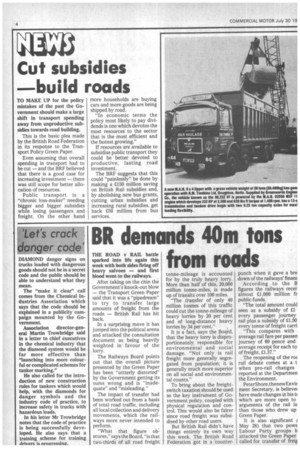BR demands 40m tons om roads
Page 6

If you've noticed an error in this article please click here to report it so we can fix it.
THE ROAD v RAIL battle sparked into life again this week with both sides firing off heavy salvoes — and first blood went to the railways.
After taking on the chin the Government's knock-out blow — the Transport Green Paper said that it was a "pipedream" to try to transfer large amounts of freight from the roads — British Rail has hit back.
In a surprising move it has jumped into the political arena and attacked the consultation document as being heavily weighted in favour of the lorry.
The Railways Board points out that the overall picture presented by the Green Paper has been "uttterly distorted" by the Government getting its sums wrong and is "inadequate" and "misleading."
The impact of transfer had been worked out from a basis of total road traffic, including all local collection and delivery movements, which the railways more never intended to perform.
"What that figure obscures," says the Board, "is that two-thirds of all road freight tonne-mileage is accounted for by the truly heavy lorry. More than half of this, 20,000 million tonne-miles, is made up of transits over 100 miles.
"The transfer of only 40 million tonnes of this traffic could cut the tonne-mileage of heavy lorries by 20 per cent and of long-distance heavy lorries by 34 per cent."
It is a fact, says the Board, that the heavy lorry is disproportionately responsible for environmental and social damage. "Not only is rail freight more generally segregated from population; it is generally much more superior on all social and environmental counts."
To bring about the freightswitch taxation should be used as the key instrument of Government policy, coupled with physical regulation and control. This would also be fairer since road freight was subsidised by other road users.
But British Rail didn't have things entirely its own way this week. The British Road Federation got in a counter punch when it gave a bre down of the railways' financ According to the B figures the railways recei' almost £1,000 million fr public funds.
"The total amount could seen as a subsidy of £1 every passenger journey rail plus a subsidy of £1.50 every tonne of freight carri "This compares with average rail fare per passen journey of 60 pence and average receipt for each to. of freight, £1.37."
The reopening of the roz rail debate comes at a t when pro-rail changes reported at the Departmen the Environment.
PeterShore,thenewEnvir ment Secretary, is believe( have made changes in his t( which are more open to arguments of the rail lo than those who drew up Green Paper.
It is also significant ( May 28) that two powe Labour Party groups h attacked the Green Paper called for transfer of freig




















































































